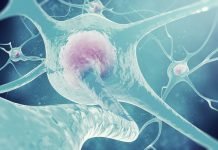
In patients with Alzheimer’s disease, amyloid-beta protein fragments accumulate in the tissue and blood vessels of the brain, likely due to a faulty clearance mechanism.
In a new study, researchers found that improving blood vessel health in the brain may help combat Alzheimer’s disease.
They found that very slow spontaneous vessel pulsations—also known as ‘vasomotion’ – drive the clearance of substances from the brain.
This means targeting and improving this process may help to prevent or treat amyloid-beta accumulation.
The research was conducted by a team at Massachusetts General Hospital (MGH).
In the study, the team found vasomotion was critical for clearing dextran from the brain and stimulating an increase of the amplitude of these vessel pulsations could increase clearance.
Also, in mice with a condition that causes amyloid-beta to build up in the walls of the brain’s blood vessels, vessel pulsations were hindered and clearance rates were reduced.
The study was able to show for the first time that large dilations and contractions of vessels that happen spontaneously at an ultra-low frequency are a major driving force to clear waste products from the brain
The findings highlight the importance of the vasculature in the treatment of Alzheimer’s disease.
If new treatments could promote healthy vasculature and therefore improve the clearance of amyloid-beta from the brain, they may be able to prevent or delay the onset of Alzheimer’s disease in the future.
The lead author of the study is Susanne van Veluw, Ph.D., a researcher in the Department of Neurology at MGH.
The study is published in Neuron.
Copyright © 2019 Knowridge Science Report. All rights reserved.




